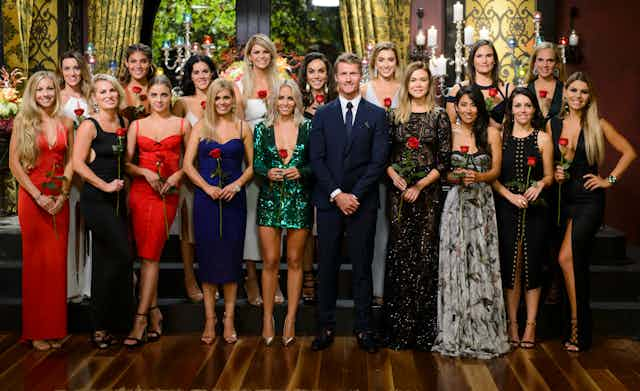Channel Ten is currently screening Australia’s fourth series of the reality TV program The Bachelor (2013-), a franchise imported and adapted from the US. The show seems a guilty pleasure for its mostly female audience, who live vicariously through contestants vying for the attention of Bachelor Richie Strahan.
Audiences are encouraged to embrace “traditional” romance narratives (overlooking same sex or bisexual relationships). But what’s most disturbing about The Bachelor is the way it drives women to undermine one another.
Unlike a Cinderella or a Snow White fairy tale, the romance isn’t limited to two lovers of the opposite sex, but manifests in a bevy of perfectly sculpted women battling for the affections of a single man. This is heterosexual love as virtual blood sport.

Housing numerous women within a mansion, plying them extensively with alcohol and asking them to fight over one man does not bode well for female friendship. The math alone equals trouble. This female rivalry illustrates a challenging fact: sexism is not determined by one’s gender. Women can be just as sexist as men. And under certain conditions, they can be worse.
The designated “villain” of the series, 29-year-old account manager Kiera Maguire, provides what producers are looking for as she gushes forth disparaging comments about her fellow contestants. Unfortunately, in providing this kind of entertainment she enacts a form of sexism that might be termed “female misogyny”.
However, perhaps her antics reveal more about the show’s creators, who engineer confrontation, prompt contestants for soundbites and edit together artificial conflict.
Maguire has reportedly said that The Bachelor has ruined her life, with the leaking to the media of information about her childhood in a polygamous cult. This kind of exposure isn’t accidental – it’s the job of producers to drum up as much publicity as possible.
Producers have extraordinary power. This is vividly examined in the American drama UnReal (2015), based on Sarah Gertrude Shapiro’s experience of being a US Bachelor producer. The program follows producer Rachel Goldberg (Shiri Appleby) as shes goes to astonishing (and unethical) lengths in manipulating contestants to manufacture drama.

Narratives like The Bachelor give prominence to women, but push them to devalue one another on the basis of their looks, or lack of acceptably “feminine” behaviour.
This dynamic of women enacting patriarchal values has powered some classic films: Mike Nichol’s Working Girl (1988) with ruthless business woman (played by Sigourney Weaver) cruelly undermining her underling (Melanie Griffith), or cult movie Heathers (1988), whose lethal characterisation of bitchiness influenced Mean Girls (2004).
Variations on this theme of catty female rivalry has inspired many television programs, such as the popular Pretty Little Liars series (2010-present).
The current series of the Bachelor dramatises far more aggressive conflicts than previous seasons. Provoking competitive nastiness amongst women is a winning ratings strategy.
Tellingly, in the first episode of this year’s Bachelor (aired on July 27) 24 year old Melbourne-based artist Georgia Tripos likens her fellow contestants to a “pack of hyenas”, asserting that she’s “seen this behaviour before, but in primary school.”
Illustrating this point is 31 year old support worker Rachael Gouvignon, who undercut Maguire’s moment of triumph by describing her as a “wicked witch” after she won a date with the Bachelor and was gifted a beautiful Cinderalla-like gown to wear on the occasion.
The insult “witch” has long been a criticism of powerful women – Bronwyn Bishop and Sophie Mirabella famously standing in front of “ditch the witch” placards during Gillard’s time as PM indicate that Tony Abbott was not alone in his “alleged” misogyny.

The Bachelor’s meticulously organised group dates are designed to pit each woman against the other. In a more recent episode (aired on August 11) the conflict did not disappoint.
Even good-natured contestants can produce insulting sounds bites, such as 26 year old hairdresser Faith Williams, who described Maguire as a “duck dressed up as a kangaroo” when the latter pouted about being coerced into wearing an absurd kangaroo outfit.
Judging women by their looks alone buys into a sexist and reductive value system. Ariel Levy’s important book Female Chauvinist Pigs: Women and the Rise of Raunch Culture (2005) considers how women’s objectification of one another enacts sexist behaviour. The competitive desire to be the sexiest woman in the room (or in the case of The Bachelor, the mansion) might win the admiration of the single man, but women undermine themselves by trying to fulfil chauvinistic fantasies.

Undoubtedly, men can be just as competitive and this was made abundantly clear in last year’s Australian premiere of The Bachelorette (where the gender ratio is reversed). However the rivalry was diffused by the program’s focus on its heroine’s emotions, Sam Frost. (The year before Frost won the 2014 season of the Bachelor, but was subsequently publicly dumped by Bachelor Blake Garvey. She then went on to star in her own season of the Bachelorette.)
The tone of the conflict in The Bachelorette is very different from The Bachelor and in part this is because much of the screen time was devoted to Frost’s feelings. But more disturbingly, the nature of the competition was far less demeaning. The heady cocktail of spite that is onscreen right now sharply contrasts with that sense of camaraderie developed by the men in The Bachelorette.
The unedifying spectacle of women psychologically tearing each other apart indicates that misogyny is not an exclusively masculine domain.
Suzie Gibson will be online for an Author Q&A between 2 and 3pm on Thursday, 18 August, 2016. Post any questions you have in the comments below.

